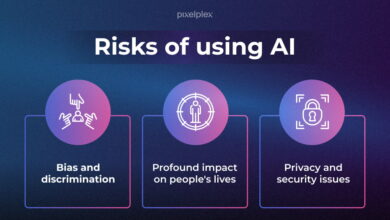India Has a Unique Opportunity to Lead in AI
India has a unique opportunity to lead in AI. This isn’t just hype; it’s a confluence of factors – a burgeoning tech sector, a massive pool of skilled engineers, and a government increasingly focused on digital transformation. But can India truly seize this moment? This post dives into the potential, the challenges, and the crucial steps needed to propel India to the forefront of artificial intelligence innovation.
From revolutionizing agriculture with AI-powered precision farming to transforming healthcare through advanced diagnostics and personalized medicine, the potential applications are vast. The financial sector stands to benefit immensely from AI-driven fraud detection and improved customer service. However, significant hurdles remain, including addressing the digital divide, ensuring data privacy, and fostering a culture of ethical AI development. Navigating these challenges effectively will be key to unlocking India’s AI potential.
India’s Current AI Landscape
India is rapidly emerging as a significant player in the global AI arena, driven by a burgeoning tech sector, a large and skilled workforce, and proactive government initiatives. However, challenges remain in bridging the gap with established AI powerhouses like the USA and China. This section delves into the current state of India’s AI ecosystem, highlighting its strengths, weaknesses, and its position on the world stage.
AI Infrastructure in India
India possesses a robust foundation for AI development. Several leading research institutions, including the Indian Institutes of Technology (IITs), Indian Institutes of Science (IISc), and numerous universities, contribute significantly to AI research and innovation. These institutions nurture a growing pool of talented researchers and engineers. Furthermore, the government has launched various initiatives such as the National AI Strategy and the Digital India program, aiming to foster AI adoption across sectors and create a supportive ecosystem.
Private sector participation is also robust, with numerous startups and established companies investing heavily in AI research and development, particularly in areas like machine learning, deep learning, and natural language processing. This active engagement across academia, government, and industry is crucial for driving India’s AI progress.
Strengths and Weaknesses of India’s AI Ecosystem
India boasts a considerable advantage in its large and relatively inexpensive pool of skilled engineers and data scientists. This talent pool, combined with the government’s push for digitalization, creates a fertile ground for AI development. The vast amount of data generated within India, from diverse sources like social media, e-commerce, and government records, provides rich resources for training AI models.
However, challenges persist. Funding for AI research, while increasing, still lags behind that of leading nations. Access to advanced computing infrastructure, such as high-performance computing clusters, remains a constraint for some researchers. Additionally, the need for greater focus on ethical considerations and responsible AI development is crucial to ensure the technology’s beneficial deployment.
Comparative Analysis of India’s AI Development
The following table compares India’s AI development with that of the USA and China across key aspects:
| Aspect | India | USA | China |
|---|---|---|---|
| Research Output (Publications) | Growing rapidly, but still behind the USA and China | Highest globally, significant contributions across all AI subfields | Second highest globally, strong focus on applications and deployment |
| Funding (Public & Private) | Increasing, but significantly lower than the USA and China | Highest globally, substantial government and private investment | Second highest globally, massive government-led investments |
| Skilled Workforce | Large and growing pool of skilled engineers and data scientists, relatively lower cost | Large and highly skilled workforce, leading in AI talent acquisition | Large and rapidly growing workforce, significant focus on AI education |
| Government Support | Increasing support through various initiatives and policies | Significant government funding and policy support | Strong government leadership and strategic focus on AI development |
Note: This comparison provides a general overview. Precise figures for research output and funding vary depending on the source and metrics used. The table aims to illustrate relative positions rather than providing exact quantitative data. For example, while the exact number of publications is difficult to definitively quantify across nations due to variations in indexing and reporting, the general trend of the USA and China leading in overall research output remains consistent across major academic databases.
Similarly, while precise funding figures are subject to reporting variations, the substantial difference in scale of investment between India and the other two nations is widely acknowledged.
Developing a Skilled AI Workforce
India’s ambition to become a global AI leader hinges critically on cultivating a robust and skilled workforce. This requires a multi-pronged approach encompassing educational reforms, targeted training initiatives, and strong industry collaborations. Without a sufficient pool of talent, even the most innovative AI strategies will fall short.A comprehensive plan must address both the immediate need for skilled professionals and the long-term goal of building a sustainable AI ecosystem.
This involves attracting and retaining top talent domestically while simultaneously attracting international expertise. Crucially, the plan must be adaptable and responsive to the ever-evolving landscape of AI technologies.
Educational Program Reforms
Revamping India’s education system is paramount. This necessitates integrating AI concepts into school curricula from an early age, fostering computational thinking and problem-solving skills. At the higher education level, universities need to expand their AI-focused programs, offering specialized degrees and certifications in machine learning, deep learning, natural language processing, and computer vision. These programs should emphasize practical application through hands-on projects and internships, bridging the gap between theoretical knowledge and industry demands.
Furthermore, continuous professional development programs for working professionals should be widely available, enabling upskilling and reskilling to keep pace with technological advancements.
Targeted Training Initiatives
Targeted training initiatives, beyond traditional academic pathways, are crucial. The government could sponsor boot camps and workshops focused on specific AI skills, such as data science, AI ethics, and AI safety. These programs should be accessible to a diverse range of individuals, including those from underrepresented communities, ensuring inclusivity and equity within the burgeoning AI sector. Partnerships with industry leaders could provide access to real-world datasets and mentorship opportunities, enhancing the practical relevance of training.
India’s potential to dominate the AI landscape is undeniable, fueled by its massive talent pool and growing tech sector. It’s fascinating to consider this alongside completely unrelated news, like this recent revelation: a dem court filing suggests trump impeachment probe began before mueller even submitted report , showing how quickly political landscapes can shift. Ultimately though, India’s focus on AI development remains a key factor in its future global influence.
Furthermore, online learning platforms, offering flexible and affordable access to AI education, should be expanded and promoted.
Industry Partnerships
Strong industry partnerships are essential for creating a skilled AI workforce. Collaboration between academia and industry can lead to the development of relevant curricula, internships, and job placement opportunities. Companies should invest in training programs for their employees, ensuring their workforce is equipped with the necessary AI skills. Government incentives could encourage such collaborations, fostering a mutually beneficial relationship between educational institutions and the private sector.
India’s burgeoning tech scene and massive talent pool give it a real shot at AI leadership. However, global political shifts, like the implications of Trump’s presidential appointments – check out this insightful piece on what Trump’s picks suggest about how his presidency will go – could impact the international landscape and influence India’s trajectory. Ultimately, navigating these global currents will be key to India seizing this incredible AI opportunity.
This collaborative approach ensures that the skills being taught are directly relevant to industry needs, reducing the skills gap and boosting employability.
National AI Training Program: A Hypothetical Model
A hypothetical national AI training program could be structured as follows: The curriculum would encompass foundational mathematics, statistics, programming (Python, R), machine learning algorithms, deep learning techniques, data visualization, and ethical considerations in AI. Funding could be secured through a combination of government grants, private sector investment, and international collaborations. Assessment methods would include regular quizzes, project-based assignments, and a final capstone project showcasing practical application of learned skills.
The program would offer various entry points, catering to individuals with diverse educational backgrounds and experience levels, including scholarships for students from economically disadvantaged backgrounds. The program would also incorporate industry mentorship and job placement services to ensure successful integration into the workforce. Successful completion would result in a nationally recognized AI certification, enhancing the credibility and marketability of graduates.
Strategic Partnerships and International Collaboration
India’s ambition to become a global leader in AI necessitates strategic partnerships and robust international collaborations. These collaborations aren’t merely about sharing knowledge; they’re about accelerating innovation, accessing cutting-edge technologies, and fostering a vibrant ecosystem that propels India’s AI capabilities to the forefront. By strategically engaging with global partners, India can overcome limitations in resources and expertise, ultimately benefiting its economy and society.International collaborations offer India several crucial advantages in AI research and development.
Access to advanced technologies, particularly in areas like quantum computing and specialized hardware, is crucial for pushing the boundaries of AI. Furthermore, collaborations provide access to a wider pool of talent, fostering knowledge transfer and accelerating the development of skilled AI professionals within India. Finally, collaborative projects often attract significant funding, both from international organizations and private investors, alleviating financial constraints that can hinder research and development efforts.
Potential International AI Partners for India
The selection of appropriate international partners is crucial for maximizing the benefits of collaboration. Partnerships should be based on complementary strengths, shared research interests, and a commitment to mutual benefit.Several countries and organizations stand out as potential partners for India. The United States, with its robust AI research ecosystem and substantial private sector investment, offers significant opportunities for collaboration in areas like deep learning and natural language processing.
Similarly, the European Union, known for its focus on ethical AI and data privacy, provides a valuable partnership for developing responsible AI solutions. Israel, a global leader in cybersecurity and AI-driven solutions, offers complementary expertise in areas where India is actively developing its capabilities. Finally, collaborations with organizations like the World Economic Forum (WEF) and the Organisation for Economic Co-operation and Development (OECD) can provide valuable insights into global AI trends and best practices.
Accessing Advanced Technologies, Expertise, and Funding through Partnerships
Effective partnerships can provide India with direct access to advanced technologies. For instance, collaborations with US companies specializing in quantum computing could help India develop its own quantum AI capabilities. Similarly, partnerships with European institutions could provide access to cutting-edge AI research tools and datasets. This access accelerates research and development cycles, enabling India to remain competitive on the global stage.The exchange of expertise is another crucial benefit.
India’s burgeoning tech scene and massive talent pool give it a unique opportunity to lead in AI. The sheer scale of potential applications is mind-boggling, and securing funding will be key; consider how the article, the harris campaign is a marvel of money raising will it matter , highlights the importance of effective fundraising in high-stakes endeavors.
This financial prowess translates directly to the AI arena, shaping India’s ability to compete on a global scale and ultimately seize its leadership potential.
Joint research projects and exchange programs facilitate the transfer of knowledge and skills between Indian and international researchers. This helps nurture a more skilled AI workforce in India and exposes Indian researchers to diverse perspectives and approaches.Finally, international collaborations can attract substantial funding for AI research and development. Joint projects often secure grants from international funding agencies, while partnerships with private sector companies can attract significant investment.
This influx of funding helps sustain long-term AI research efforts and build a more robust AI ecosystem within India.
Ethical Considerations and Responsible AI Development: India Has A Unique Opportunity To Lead In Ai
India’s burgeoning AI sector presents a unique opportunity to not only become a global leader but also to establish ethical AI development as a core principle. The rapid advancement of AI technologies necessitates a proactive approach to address potential ethical dilemmas and ensure responsible innovation. Ignoring these considerations could lead to significant societal harm and hinder the potential benefits of AI for India’s diverse population.Ethical considerations are paramount in the Indian context due to the country’s unique social fabric, vast socioeconomic disparities, and the potential for AI to exacerbate existing inequalities.
The responsible development and deployment of AI systems must prioritize fairness, transparency, and accountability to ensure equitable outcomes and prevent the perpetuation of biases.
Potential Ethical Dilemmas and Mitigation Strategies
Several ethical dilemmas could arise from the application of AI in India. For instance, biased algorithms used in loan applications could disproportionately affect marginalized communities, perpetuating financial exclusion. Similarly, AI-powered surveillance systems, if not implemented carefully, could infringe on citizens’ privacy rights and lead to discriminatory practices. Facial recognition technology, while potentially useful for law enforcement, raises concerns about accuracy and potential misuse, especially in a diverse country like India.To mitigate these risks, a multi-pronged approach is necessary.
This includes rigorous testing and auditing of AI systems to identify and correct biases; establishing clear guidelines and regulations for data privacy and security; promoting transparency in algorithmic decision-making; and fostering public awareness and engagement in AI ethics discussions. Independent oversight bodies could play a crucial role in monitoring the ethical implications of AI deployments and ensuring accountability.
Furthermore, investing in research on fairness and bias mitigation techniques tailored to the Indian context is vital.
A Framework for Responsible AI Development in India
A robust framework for responsible AI development in India should be built upon three foundational pillars: Fairness, Transparency, and Accountability. Fairness ensures that AI systems do not discriminate against any particular group or individual. Transparency requires that the decision-making processes of AI systems are understandable and explainable. Accountability holds developers and deployers responsible for the consequences of their AI systems. This framework should incorporate robust mechanisms for oversight, auditing, and redressal of grievances. It should also promote collaboration between government, industry, academia, and civil society to establish shared ethical standards and best practices. Regular review and updates to this framework are essential to adapt to the rapidly evolving AI landscape.
The Role of Government and Industry
India’s ambition to become a global AI leader hinges on a powerful synergy between government policy and private sector investment. A proactive government can create the fertile ground for innovation, while a vibrant private sector provides the engine for growth and implementation. This symbiotic relationship is crucial for navigating the complex challenges and seizing the immense opportunities presented by artificial intelligence.The Indian government plays a multifaceted role in fostering AI innovation and growth.
This includes formulating strategic national AI policies, providing funding for research and development, establishing supportive regulatory frameworks, and promoting digital infrastructure development. Crucially, the government also needs to focus on creating an environment that attracts both domestic and foreign investment in the AI sector. This involves streamlining bureaucratic processes, ensuring data security and privacy, and fostering a culture of collaboration between academia, industry, and government.
Government Initiatives and International Examples, India has a unique opportunity to lead in ai
Successful government policies in other countries offer valuable lessons for India. For example, the US has invested heavily in AI research through agencies like the National Science Foundation and the Defense Advanced Research Projects Agency (DARPA). China’s national AI strategy focuses on developing key AI technologies and building a robust AI industry through significant government funding and support for AI-related companies.
The European Union’s approach emphasizes ethical considerations and the development of responsible AI systems, promoting a collaborative approach across member states. These diverse strategies highlight the need for a tailored approach, taking into account India’s unique strengths and challenges. India can learn from these examples, adapting successful strategies while addressing its specific context.
Private Sector Contributions to India’s AI Leadership
The private sector is the driving force behind AI implementation and commercialization. Indian companies can contribute significantly to India’s AI leadership through substantial investments in research and development. This includes funding cutting-edge AI research in universities and research institutions, supporting the development of new AI tools and technologies, and fostering innovation through internal R&D departments. Furthermore, private sector companies play a vital role in developing a skilled AI workforce through robust training programs, apprenticeships, and collaborations with educational institutions.
Investing in robust digital infrastructure, including high-speed internet access and cloud computing capabilities, is also crucial for supporting the growth of the AI ecosystem. Finally, private sector companies must prioritize ethical considerations and responsible AI development, ensuring AI systems are used fairly and transparently. Examples of successful private sector initiatives could include partnerships between Indian tech giants and educational institutions to offer specialized AI training programs or significant investments in developing AI-powered solutions for specific sectors such as healthcare or agriculture.
India’s journey to AI leadership is a marathon, not a sprint. While the challenges are real, the potential rewards are immense. By strategically investing in education, infrastructure, and ethical guidelines, and by fostering strong public-private partnerships and international collaborations, India can truly become a global AI powerhouse. The future of AI in India is bright, but it requires a concerted and visionary effort from all stakeholders.




